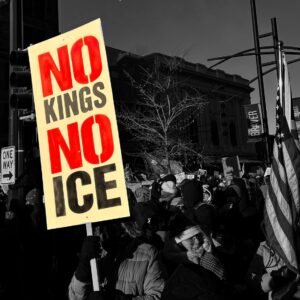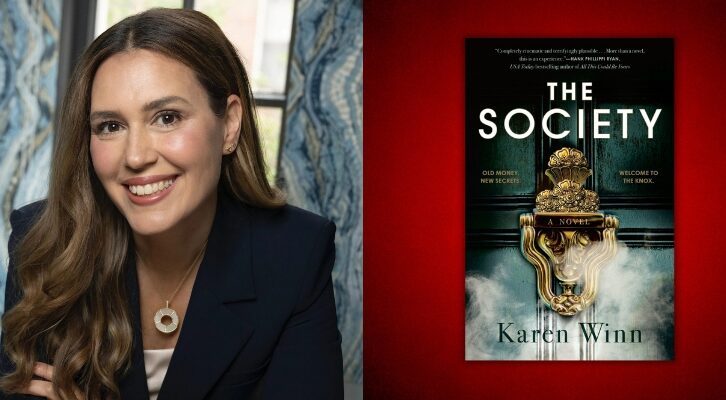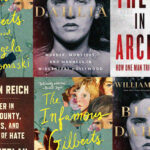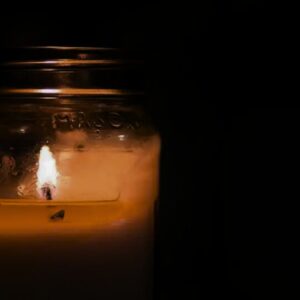
How to Read Through the Depths of Postpartum Depression
On John Gardner, Denis Johnson, and the Baby Blues
It was not my strength that wanted nursing,
it was my imagination that wanted soothing.
—Joseph Conrad, Heart of Darkness, 1899
The books I pack in my hospital birth bags are never the books I later need to have packed. What I need after birth is the literary equivalent of a long, tight hug, a whispered promise that this will pass, that you will be okay. A “feelgood” story is what I need after my body has been wrenched open, a baby excised and then tethered to me by invisible threads. People magazine is needed. Perhaps Us Weekly. I will need stories of justice and heroism, winners winning against impossible odds. Rescued dolphins, happy polar bears. I will need pictures of beautiful people in sunglasses, pushing shopping carts filled with kale and coconut water. Nothing too heavy, nothing too mean. I never believe it beforehand, but my postpartum needs include a protective circle, even around the celebrities. Even a whiff of schadenfreude will bring tears.
Experts say that after birth, a woman and her baby—the skin of one upon the skin of the other—are bathed in oxytocin: the love hormone, the magic potion responsible for sex and families and the maternal instinct. Unfortunately, like all love potions, it makes a person too open and vulnerable, too impressionable to all incoming stimuli. A person who takes a love potion in a fairy tale will fall in love with whomever she sees first, and this love will be binding. A baby monkey who does not have a mother will fall in love with a clothes hanger draped in fur.
When my hormones are finally regulated, perhaps three months in, and I am striding around in the world, all of that seems amusing. When my hormones are bottoming out on that third day postpartum, this bondage of love and its chemical facts are terrifying. Truly horrifying, as though I am staring into the mouth of hell, staring death in its grizzled face, looking at a demon and trying to remember what my mommy looks like.
And every few hours there is a baby I must feed.
* * * *
In The Art of Fiction, John Gardner’s famous book on the craft of writing, a strange assertion is made in the final pages, sandwiched between remarks about doing writing exercises. At first they seem elitist:
The true writer has a great advantage over most other people: He knows the great tradition of literature, which has always been the cutting edge of morality, religion, and politics, to say nothing of social reform. He knows what the greatest literary minds are proud to do and will not stoop to.
What do great literary minds not stoop to? And how does literary content relate to the “cutting edge of morality”? Have not all the greats depicted horrors? Even the Bible has rape scenes.
Gardner taught Raymond Carver and Joyce Carol Oates. He also wrote great, long novels and a book titled On Moral Fiction in which he skewers his contemporaries—John Barth, John Updike, and Donald Barthelme, among others—and thereby tarnishes his reputation. It is so unseemly and puritanical to speak of morals, of abstractions or absolutes like “Truth” and “Goodness.” I know of his writing through my father, who calls Gardner’s novels “moral” without explaining what he means, beyond the fact that after reading them he feels hope.
In On Moral Fiction Gardner suggests that “it is for the pleasure of exercising the capacity to love that we pick up a book at all.” We sometimes forget how what pleases us sometimes corresponds to what is good for us, often at this intersection called love. This may be an answer to why writers write as much as it explains why readers read. It is for the same pleasure—of exercising the capacity to love—that we build families, have children.
Of course, sometimes the force of love is no pleasure.
* * * *
I was smarter in the ignorance of my first pregnancy. I packed my magazines, temporarily forgetting books, focusing on motherhood. I cheerily read my fashion advice and celebrity gossip. I did hit bottom on the fifth day—that thing they call “baby blues”—and it was not like any blues I’d ever felt. It was more like the grief after a loved one has died. Every time I thought about the life I’d had before motherhood, I burst into tears. I believed I was grieving my former self. I cried when my dog cocked her head at me with what looked like sympathy, and I cried when my husband held the baby so that I could get dressed. When the dog lapped at my husband’s glass of juice, I moaned and mourned over it. It had been his favorite juice, and now it was all gone!
Everything seemed lost, everywhere diminished. There was, and would forever be, too little of me. Too little time for each other, too little sleep. But these blues did pass; my hormones regulated.
For a while, it seemed like a good idea not to have any more children.
But 22 months later, there we were again, in the hospital, my body torn up and ravaged, nearly too sodden and heavy to walk, and a newborn baby mewling in her bassinet. We had ourselves discharged within 24 hours, thinking that getting home sooner might stop the arrival of torrential grief, but we could not outrun it. This time I was reading books again. Literature had been my constant. Except for those weeks surrounding my first daughter’s birth, I had read books for company since I was a child and had made books my life as much as I could, so I thought that books, novels, any story well told must be the salve. I read instead of sleeping, which was a big mistake. The grief came and kept me from resting. I was afraid to be alone, lonely for my husband and toddler, afraid to sleep. It is a kind of bottoming out, as they call this hormonal transition. It feels like you have swooned too far too quickly, as on a roller coaster, as to the bottom of a whirlpool, looking up at a wall of water soon to come crashing down.
In the bottom of that bottoming out, I read Olive Kitteridge by Elizabeth Strout. It is a beautifully written novel-in-stories, winner of the Pulitzer Prize, and it terrified me. Old age would come, and perhaps it would be lonely like Olive’s. Sentences drove themselves like stakes into the loosened soil of my oxytocin-addled brain: “There are worse things than chaos,” Olive thinks, looking at her grown son and his young family. There are worse things than chaos. There are worse things than chaos. How horrible! There are worse things than this? Than a two-year-old and a baby and a husband, all of whom you love, all of whom you’ll never find enough energy and time to properly love?
With falling in love comes, swiftly, the failure of love. This happens to me with each new relationship: I know that I will eventually lose my loved one or be lost. I know that my love will fail, no matter how much I want to honor it. I am too little to prevent the passage of time, the loss of my children to their own lives, the fact that I will hurt them and they me, and, in the end, the death that we will all face.
* * * *
I read to my children from Where the Wild Things Are, haunted by its phrases, too: “We’ll eat you up, we love you so.” Even something with as little edge as a cuddly Muppet—even our Elmos and our Kermits—seemed warped and frightening in those days of facing my own darkness and my own shortcomings. Their cheer was a life raft, and I could see how flimsy it was. A mere puppet, not real. That Sesame Street theme song—su-u-u-nny days—was about a place I would never again be able to visit.
The grief did not pass that time, not for many months and almost over a year. It grew into the hungry beast of postpartum depression, and I didn’t know it until it was almost too late.
More than two years later, I prepared for my third birth and its attendant grief as I had once prepared for labor. I saw a psychiatrist. I took my vitamins and kept up with exercise. I made vows to myself to find sleep. I got sleeping pills. I even encapsulated my placenta because I had been told it could put a dent in postpartum despair. I would spend a few extra days in the hospital to get more rest and to have more people watching over me. I wasn’t going to let depression grab me by the throat again. This time I was going to wait for it behind a door with a baseball bat, a trembling woman awaiting an intruder.
I did not think through appropriate reading material as carefully. The novel Angels by Denis Johnson sat in my duffel bag, ticking.
* * * *
I don’t believe in censorship. Neither does Gardner. But still, he writes:
Every writer should be aware that he might be read by the desperate, by people who might be persuaded toward life or death. It does not mean . . . that writers should write moralistically, like preachers. And it does not mean that writers should lie. It means only that they should think, always, of what harm they might inadvertently do and not do it.
What is the writer’s responsibility to her readers? Isn’t the writer responsible only to the work? The writer has a responsibility not only to the reader but to telling the truth as she sees it. Literature must grapple; it must reveal. I want grappling and revelations, too. I don’t believe in literature as distraction.
I don’t believe that literature should be an escape—merely escapist, merely entertaining—and I do not believe it should be didactic or moralizing. I read for simpler reasons. For company. For me, stories have always been a salve against loneliness, perhaps a crutch. More real than reality. When I first moved out into my own apartment, homesick and broke, I watched Live with Regis and Kelly and other morning shows not because I enjoyed the banter but because it kept alive for me the idea of New York, which, for some reason, I found soothing. Good novels and stories are like that fake backdrop of the Manhattan skyline, only more beautiful and less false.
Gardner urges writers to remember that we live in a world “where teenagers have a chemical propensity toward anguish, people between their thirties and their forties have a tendency to get divorced, and people in their seventies have a tendency toward loneliness, poverty, self-pity, and sometimes anger.” We live in a world in which people are doing difficult things, facing evil, undergoing hardship, losing loved ones. We live in a world vulnerable to hormonal shifts. Women who have just delivered their babies sometimes feel like they have lost all their cushioning. In that world after birth, it always seems that the stories I told myself about the meaning of life—that it had meaning, that people were good—were all false, with nothing to replace them.
What would it mean to write with our readers’ emotional lives in mind? Perhaps it means only to write as we would want to be read, with forgiveness and with care.
* * * *
It is not Denis Johnson’s fault that I lost two liters of blood after labor and had to have emergency surgery; it is not Johnson’s fault that I again teetered at the edge of a chasm, nearly falling in. It is the babies, the hormones, the horrible flux of those careening feelings, yet another thing we must endure after having endured birth itself. The deck is stacked against us: around the third day, after we are sleep-deprived and our milk comes in, so too do the hormones flood us. Before that, there is something like a shift change: hockey players abandoning the ice to tag in the alternates. For the span of that transition, after the old hormones have gone away but before the new ones are there to replace them, the net is undefended.
This time, the grief came in the span of a moment. My midwife asked me, “Are you feeling good?”
“Oh, yes,” I said. “I think I am, actually. Maybe the placenta worked.”
She left the room to answer a call, and when she returned, I was bawling.
* * * *
Since becoming a mother, I have realized what it means to be a woman. I don’t mean physically, of course. It’s only that my body had not been limited in this way before. I had never been so vulnerable. I had gone striding around the world exactly like a man, never in need of protection. Now it seems to me that the world is not divided by lines of gender—not by sex organs or by performances of masculinity and femininity—but only by hormones. The hormones that make us vulnerable versus the hormones that make us offend. With a baby, that embodiment of loneliness and vulnerability, comes horror at the possibility that you cannot be trusted with her. You are not enough to protect her. The world is too big and too vicious and you are too little. You need a world in which the men set out lifeboats and say “Women and children first.” Even if it goes against everything you believe.
After that third birth, the night after my hormones left me defenseless, I lay in my bed, baby asleep nearby, the IV tower releasing blood into my body by little clicks and sighs. I pulled in a breath, yoga-style, and tried to push it calmly through the rivers of my body. Tears came trembling to my lips and nose, but I forced them away. Bad habit would not beget bad feeling. I picked up Denis Johnson’s first novel with my unencumbered hand. I began to read.
If you’ve read Johnson, you’ll know that the prose is extraordinary: it is beautifully rendered, with images that startle you with their originality, daring sentences with an edge of cruelty. They are like glittering knives. An example: “She stared with hatred at [her daughter’s] closed eyes and soon realized the child had fallen asleep. The weightlessness of fear replaced the weight of anger as the bus sailed down the gullet the headlights made.” The gullet the headlights made—what an image. You feel yourself hurtling; it puts the reader in motion. Another: “The four motels of Jamie’s experience had all been flat. They hadn’t stood up to declare themselves for six stories amid congested Pittsburgh, they had only reclined by their swimming pools taking the dust off the cars going by.” The sentences work hard against cliché.
Angels features a broke (and broken) young woman who is traveling by bus across the country with her baby and toddler. As I read, my throat dried up. I became frightened as I closed my eyes to go to sleep, almost paranoid in my thinking. I could hear voices outside my hospital room, someone shouting into a phone in a foreign language, and I hugged my blanket to myself, fearing the sort of thing that was about to befall Johnson’s character. Someone was about to slip her drugs. Someone was going to rape and knife her. Eventually, she would come down from whatever high and hazily realize that she didn’t know the person looking after her children.
She was on her back with her hands cuffed behind her, her knees locked under her chin by the ongoing adrenaline convulsion of fear. Peripherally she understood that nobody human was messing with her like this, but something much more dangerous, a dark configuration of people and events, something original, something about to be named.
I closed the book after this rape scene. The scene in which one rapist exclaims about how beautiful it is while the other suggests they do “something” with a knife.
Parenting can be bleak. To do it, we need beliefs to buoy us. For example: No matter what happens your children will be okay. For example: Everything will be okay as long as you love them.
* * * *
Geoff Dyer writes that central to “Johnson’s dramatized worldview is the belief that it is the mangled and damaged, the downtrodden, who are in the best place to achieve—withstand is probably a better verb—enlightenment.”
Oh, let Johnson be wrong. It goes against all of my better judgments of taste and politics to recommend that anyone stay away from any books. But some allowances must be made for vulnerability. Sometimes, as the psalmist says, your soul is like a weaned child within you. Avoid Angels until you are large enough to withstand it.
As for me, I still do not know how the story turns out. I am afraid that it will reignite that grief and horror, as though the pages themselves are loaded with toxins. I turned instead to a novel by John Gardner. In the valley of postpartum hormones, I trusted only Gardner not to frighten me with the awful truth of the world. I read his long novel Mickelsson’s Ghosts, which, despite some dark and difficult content, did not disturb me. Things do not end up all right, exactly, but it’s true: you will be okay. This too shall pass, and you are never, never alone.
Liz Windhorst Harmer
Liz Windhorst Harmer is a Canadian writer and the winner of a 2013 National Magazine Award for personal journalism as well as the 2013 Constance Rooke Award for Creative Nonfiction. She and her young family recently relocated to Southern California, where she is at work on a short story collection and a novel.


















